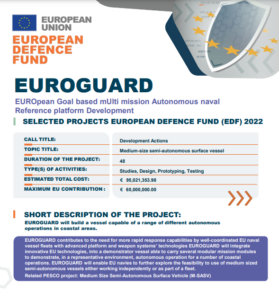The Estonian Centre for Defense Investments (ECDI) and Baltic WorkBoats this month kicked off leading a four-year pan-European Union defense cooperation to develop a prototype semi-autonomous modular vessel for European navies.
The project, EUROpean Goal based mUlti mission Autonomous naval Reference platform Development (EUROGUARD), seeks to develop and build a medium size semi-autonomous surface vessel prototype capable of performing a range of different autonomous operations in coastal areas.

ECDI said EUROGUARD is one of the largest transnational development and innovation projects indeed by the EU’s European Defense Fund (EDF), costing over $103 million covered by member countries and companies.
This is divided into about $70.8 million from the European Commission and $32.6 million from participating countries and companies themselves.
The project includes 23 companies and research institutions across 10 EU member states. In this schema, Baltic WorkBoats leads the consortium of organizations while ECDI runs the government side.
Baltic Workboats announced the start of the project on Jan. 17.
EUROGUARD is divided into three phases: developing the vessel architecture, creating and testing the prototype by 2027, and developing the architecture for a data-centric autonomous ship.
The company said while specific vessel capabilities will be determined via research and development work it is aimed at being capable of autonomous navigation, obstacle and threat detection, collision avoidance, and other mission-specific tasks.
It also has to adhere to “the principle of modularity, allowing it to be assembled according to specific needs or tasks. Innovation is also expected in the propulsion system, with environmental sustainability being an important keyword.”
Baltic Workboats will ultimately be responsible for test vessel construction at its Nasva factory in Estonia. Sea trials will be conducted in Estonian waters with the Estonian Navy.
Other participants include Italy’s Fincantieri and Leonardo, Norway’s Kongsberg Maritime, France’s Naval Group SA and Thales, and Spain’s Navantia S.A.
“Our joint interest is to advance shipbuilding technologies and develop a universal vessel platform that can be modularly adapted according to missions,” Ats Janno, head of ECDI’s project office, said in a statement.
“Being entrusted with a leading role in such a synergistic European defense industry project demonstrates Estonia’s forefront position in innovation,” he continued.
The EDF aims to support defense research, development and innovation to improve the competitiveness of the European defense industry and improve cooperation between companies and research institutes in the defense sectors among the members, the Estonian government said.
ECDI said the last EDF cooperation project had Estonia lead the $35.5 million iMUGS project to develop a standard solution for European unmanned ground systems.